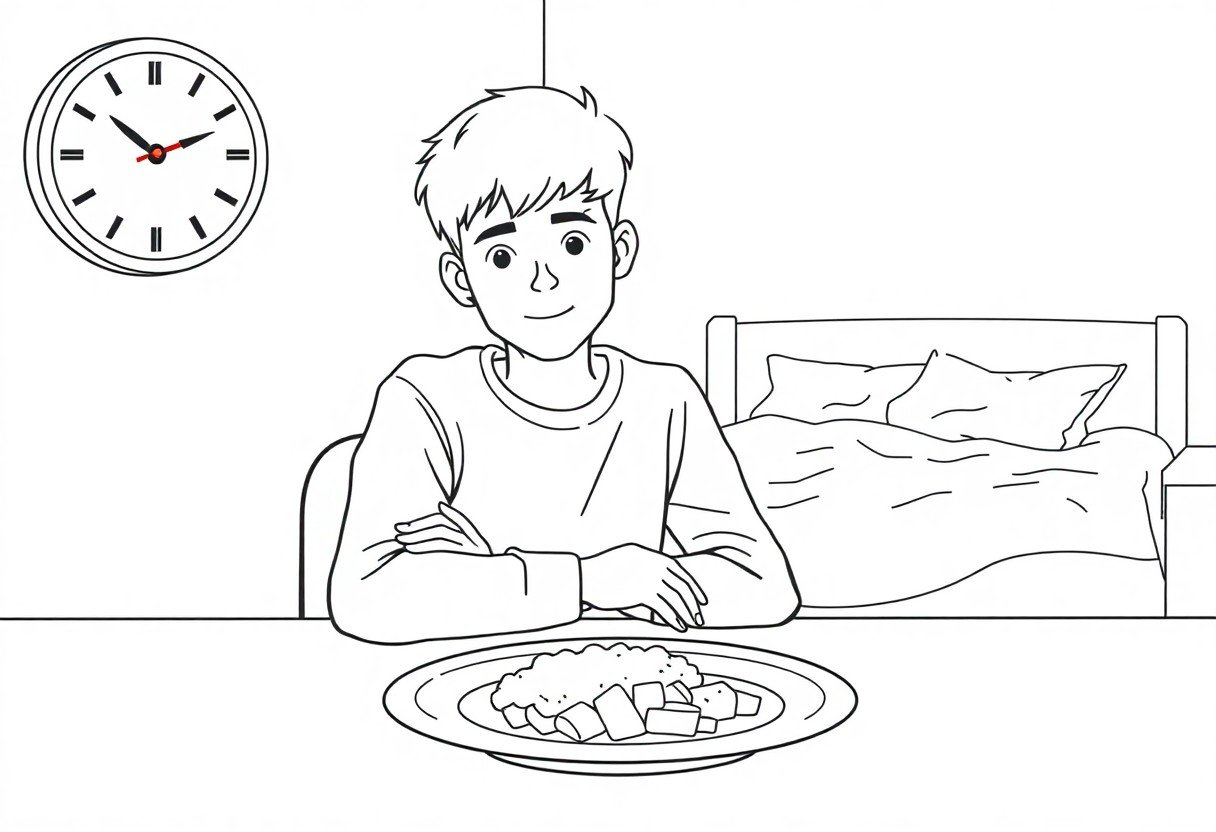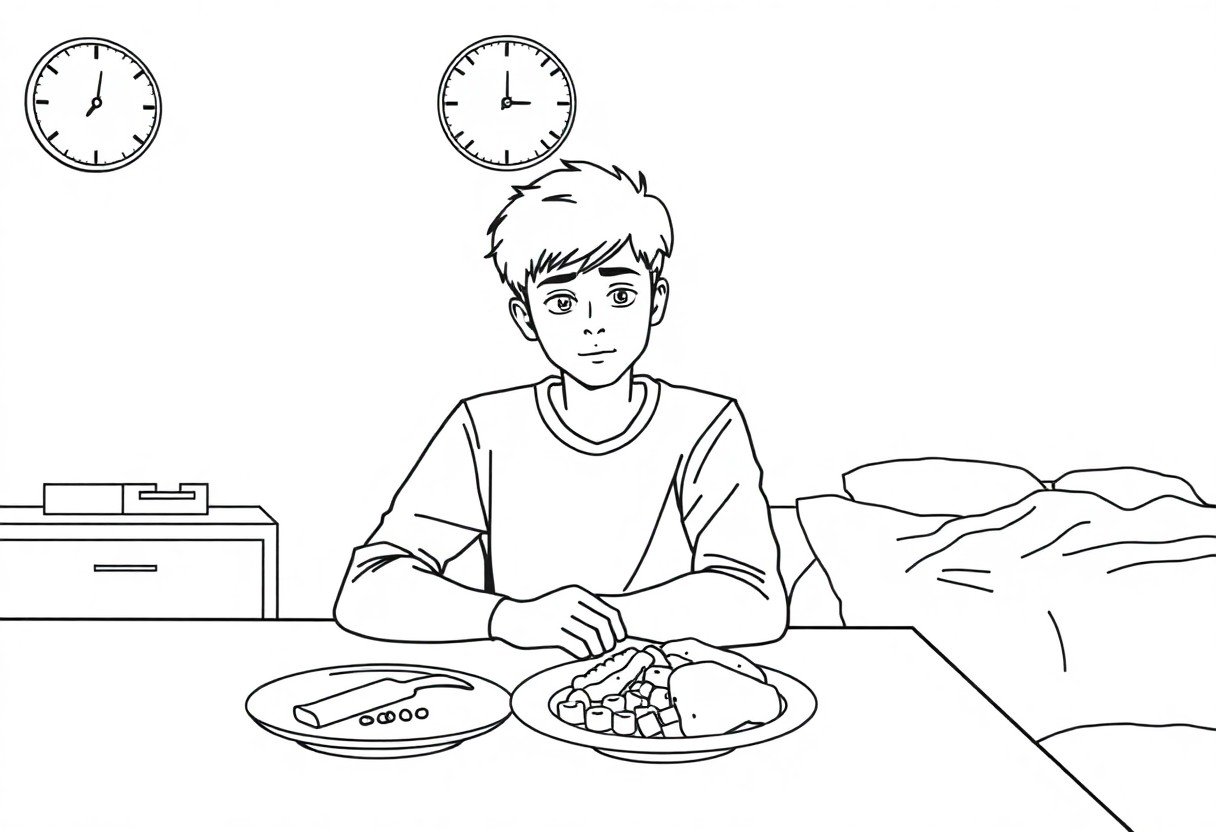Are Extreme Changes In Eating And Sleeping Patterns Warning Signals For Teen Mental Health?
Most teens experience fluctuations in eating and sleeping patterns, but extreme changes can serve as warnings for potential mental health issues. You might notice significant variations in your appetite or sleep schedule, and these shifts could indicate underlying emotional distress or anxiety. It’s necessary to recognise that these changes can lead to serious consequences if ignored. Understanding the connection between your eating and sleeping habits and your mental well-being can empower you to seek help and make informed decisions about your health.
Extreme Eating and Sleeping Changes in Teens: Understanding the Impact on Mental Health
Extreme Eating and Sleeping Changes in Teens
Key Takeaways:
- Extreme shifts in eating or sleeping habits can indicate underlying mental health issues in teenagers.
- Changes in appetite and sleep patterns may be early warning signs for conditions like anxiety, depression, or stress.
- Monitoring these changes can aid parents, educators, and mental health professionals in identifying those in need of support.
- Encouraging open communication about emotional well-being can help teens feel comfortable discussing their experiences.
- Interventions, including counseling and lifestyle adjustments, can be effective in addressing these changes and improving overall mental health.
Understanding Teen Mental Health
Your understanding of teen mental health is vital as it shapes how you perceive and support the emotional well-being of teenagers. During these formative years, adolescents experience various challenges, including academic pressures, social dynamics, and identity exploration. These factors can significantly impact their emotional state, and recognising shifts in behaviours, such as changes in eating and sleeping patterns, is vital for identifying potential mental health issues. You play a pivotal role in offering the support and guidance teens need during this transformative period.
The Importance of Regular Eating Patterns
Teen eating habits greatly influence their physical and mental health. Inconsistent or unhealthy eating patterns can lead to mood swings, fatigue, and diminished cognitive function. When teens engage in regular, nutritious meals, they are more likely to maintain stable energy levels and have improved focus, which can benefit their overall mental well-being. Implementing a balanced diet not only supports their physical health but also positively influences their emotional state.
The Impact of Sleep on Mental Wellness
Eating a well-balanced diet is vital for teenagers, but it is equally important to consider the role of sleep in mental health. Lack of adequate sleep can exacerbate feelings of anxiety and depression, leading to more significant emotional distress.
Hence, prioritising sleep is key for maintaining mental well-being. Teens require at least 8-10 hours of sleep per night to support their emotional and physical health. Insufficient sleep can lead to irritability, impaired judgment, and increased stress levels, all of which can interfere with daily activities and relationships. Establishing healthy sleep habits is vital for enhancing mood, cognitive functions, and overall mental wellness, enabling teens to navigate their unique challenges more effectively.
Identifying Extreme Changes
Some teenagers may exhibit extreme changes in their eating and sleeping patterns, which can serve as significant warning signals for mental health issues. These alterations often manifest as drastic weight loss or gain, along with irregular sleep cycles that might disrupt daily functioning. As a caregiver or observer, it’s important to recognise these signs early to support your teen effectively.
Signs of Disturbed Eating Behaviours
The signs of disturbed eating behaviours include significant fluctuations in appetite, avoidance of certain food groups, or secretive eating habits. You might notice your teen obsessing over their body image or engaging in restrictive diets. These behaviours can indicate the presence of underlying emotional struggles that warrant attention.
Recognising Sleep Disturbances
Changes in sleep patterns can greatly affect your teen’s overall well-being. These might include insomnia, excessive sleeping, or irregular sleep schedules. You should take note if your teen often complains about tiredness or seems unusually moody, as this could reflect deeper mental health issues.
In fact, consistent sleep disturbances can be a significant factor impacting your teen’s emotional health. If your teen is frequently struggling to fall asleep or waking up multiple times during the night, it can lead to increased anxiety, irritability, and difficulties concentrating. Sleep plays a vital role in mental well-being, and recognising these changes may be the first step in helping your teen regain a healthy sleep routine.
The Connection Between Eating, Sleeping, and Mental Health
Once again, your eating and sleeping habits play a significant role in your overall mental health. Research demonstrates that poor nutrition and irregular sleep can lead to increased stress, anxiety, and depressive symptoms. When you prioritise a balanced diet and healthy sleep patterns, you not only nourish your body but also support your emotional well-being. Recognising the link between these factors can help you make informed choices that enhance your mental health.
Psychological Implications of Eating Disorders
For many, eating disorders are not just about food; they are often linked to deeper psychological issues such as low self-esteem, anxiety, and depression. These disorders can lead to a distorted body image and an unhealthy relationship with food. If you or someone you know is struggling, addressing these underlying psychological factors is vital for achieving recovery and regaining a healthy mindset.
How Sleep Disruptions Affect Mood and Behaviour
Against popular belief, sleep disruptions can have a profound impact on your mood and behaviour. It can lead to irritability, heightened emotional responses, and difficulty concentrating. You may find it challenging to cope with daily stressors, as fatigue can compromise your decision-making abilities and social interactions.
Consequently, when your sleep is disrupted, your mood can suffer, potentially leading to anxiety or depression. Poor sleep quality can also affect your concentration and reaction time, making everyday tasks seem more daunting. This can create a vicious cycle, as you might increase stress levels, which further influence your sleep patterns. By prioritising quality sleep, you can help stabilise your mood and enhance your overall mental well-being, leading to a more balanced and fulfilling life.

Check your mental health symptoms on NHS.
Risk Factors for Mental Health Issues in Teens
Not all teens experience mental health issues, but some factors can increase the risk. Be aware of signs such as extreme changes in eating and sleeping patterns, social withdrawal, and persistent feelings of sadness. Key risk factors include:
- Genetics and family history
- Trauma and abuse
- Substance use
- Academic pressure
- Social isolation
The earlier you identify these factors, the better you can address potential issues.
Environmental and Societal Influences
Any aspect of your environment can impact your mental health. Factors such as family dynamics, peer relationships, and exposure to stressful events can all play a role. For instance, living in a community with high rates of crime or poverty may increase vulnerability. Understanding these influences can help you navigate your mental health more effectively.
Biological and Genetic Predispositions
Influences on your mental health also stem from biological and genetic factors. Research shows that having a family history of mental health disorders can increase your own risk. Additionally, certain brain chemistry differences may predispose you to conditions like depression or anxiety. Exploring these factors can provide insight into your mental health journey.
Teens with a strong genetic history of mental health issues may find themselves facing similar challenges. It is important to understand that this does not determine your fate; rather, it signals a need for awareness and proactive measures. Engaging in supportive environments, maintaining open communication with loved ones, and seeking professional guidance can significantly improve your mental well-being. Fostering resilience and seeking help is key to managing your mental health effectively.
Intervention Strategies
After identifying significant changes in your teen’s eating and sleeping patterns, implementing targeted intervention strategies can help them regain balance. Encourage open conversations about their feelings and concerns, creating a safe environment for dialogue. You can explore healthy routines together, addressing any underlying issues that may contribute to these changes, and helping them connect with support systems.
Encouraging Healthy Eating and Sleeping Habits
About fostering healthy eating and sleeping habits, it’s vital to create a structured routine. You can collaborate with your teen to plan balanced meals together and establish consistent sleep schedules. Encourage them to participate in meal prep and engage in relaxing bedtime rituals, making these practices enjoyable rather than a chore.
When to Seek Professional Help
Help is necessary when your teen’s patterns significantly disrupt their daily functioning or if they exhibit signs of distress, such as prolonged sadness or withdrawal. It’s important to seek support from a mental health professional if you observe a consistent decline in their well-being.
Further, the signs indicating it’s time to seek professional help include dramatic shifts in mood, intense anxiety, or drastic weight changes. If your teen expresses feelings of hopelessness or has trouble performing daily activities, acting swiftly is important. Early intervention can lead to positive outcomes, greatly enhancing their overall mental health and coping strategies. Never hesitate to reach out; your teen’s well-being is a priority.
Case Studies and Personal Accounts
Keep an eye on the alarming trends in teen mental health. Here are some influential case studies that demonstrate the connections between extreme changes in eating and sleeping patterns and mental health issues:
- 15-year-old Sarah: Shift from 8 hours of sleep to 4 hours, leading to a diagnosis of anxiety.
- 17-year-old Jake: Declined from a balanced diet to binge eating, correlating with a depression diagnosis.
- 16-year-old Anna: Stopped eating breakfast, increased irritability noted at school, linked to stress.
- 14-year-old Ben: Moved from regular sleep to insomnia, symptoms led to significant mood swings.
Success Stories of Recovery
Along the journey to recovery, many teens have successfully transformed their mental health through healthier eating and sleeping habits. Taking proactive steps, such as seeking therapy and engaging in supportive activities, can lead to substantial improvements in well-being. You can learn from these stories to inspire your own path toward healing.
Lessons Learned from Personal Experiences
Experiences shared by teens undergoing mental health challenges highlight important insights. You might find that opening up about your struggles creates a stronger support network, while also recognising that small changes, like establishing a nighttime routine, can significantly improve your well-being.
And as you explore these personal accounts, you might discover that establishing a balanced routine around your eating and sleeping habits can have profound effects on your mental state. It’s imperative to acknowledge your feelings, as doing so fosters empathy and connection with others. Seeking help and sharing your experiences can not only aid your recovery but also strengthen your community, proving that you are not alone in your struggles.
Final Words
Upon reflecting, it’s imperative to recognise that extreme changes in eating and sleeping patterns can serve as key indicators of underlying mental health issues in teens. If you observe such shifts in yourself or someone you care about, it’s important to take them seriously and seek guidance from a healthcare professional. Ignoring these warning signals may lead to more severe emotional and physical challenges. Your well-being is paramount, so addressing these changes proactively can pave the way for healthier habits and improved mental health outcomes.
Q: What are some common extreme changes in eating patterns that may indicate mental health issues in teens?
A: Extreme changes in eating patterns can include significant weight loss or gain, skipping meals regularly, or binge eating. Teens may also develop restrictive diets that eliminate entire food groups or display an obsession with healthy eating. Such changes can be a sign of disorders like anorexia nervosa or bulimia, and they often reflect underlying emotional struggles.
Q: How can altered sleeping patterns affect a teen’s mental health?
A: Altered sleeping patterns, such as insomnia, excessive sleepiness, or irregular sleep schedules, can have a profound impact on a teen’s mental health. Lack of sleep can lead to increased irritability, difficulty concentrating, and heightened susceptibility to stress and anxiety. Additionally, conditions like depression are often linked to changes in sleep, which can worsen overall mental health.
Q: Are there specific warning signs that parents should look for regarding their teen’s eating and sleeping habits?
A: Parents should look for warning signs such as noticeable changes in weight, secrecy around meals, skipping social events that involve food, and a marked increase or decrease in sleep. If a teen complains of fatigue, exhibits mood swings, or shows a lack of interest in activities they once enjoyed, these can also signal potential mental health issues.
Q: What should a parent do if they notice extreme changes in their teen’s eating and sleeping patterns?
A: If a parent notices these changes, it is important to approach the situation with care and compassion. Open a dialogue by expressing concern without judgment. Encourage the teen to share their feelings and consider seeking the help of a mental health professional if the changes persist or worsen. Professional guidance can provide additional resources and strategies for coping.
Q: How can improving sleep and eating habits positively influence a teen’s mental health?
A: Improving sleep and eating habits can significantly enhance a teen’s mental health by stabilising mood, increasing energy levels, and improving cognitive function. Healthy eating provides crucial nutrients that support brain health, while adequate sleep restores mental clarity and emotional resilience. Together, these factors can help reduce anxiety and depression symptoms, fostering a more balanced mental state.
Mental Health in Children and Adolescents | Mental Health and Demographics







